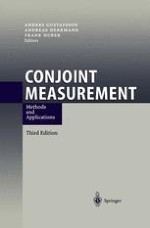2003 | OriginalPaper | Chapter
Conjoint Preference Elicitation Methods in the Broader Context of Random Utility Theory Preference Elicitation Methods
Authors : Jordan Louviere, David Hensher, Joffre Swait
Published in: Conjoint Measurement
Publisher: Springer Berlin Heidelberg
Included in: Professional Book Archive
Activate our intelligent search to find suitable subject content or patents.
Select sections of text to find matching patents with Artificial Intelligence. powered by
Select sections of text to find additional relevant content using AI-assisted search. powered by
The purpose of this chapter is to place conjoint analysis techniques within the broader framework of preference elicitation techniques that are consistent with the Random Utility Theory (RUT) paradigm. This allows us to accomplish the following objectives: explain how random utility theory provides a level playing field on which to compare preference elicitation methods, and why virtually all conjoint methods can be treated as a special case of a much broader theoretical framework. We achieve this by: discussing wider issues in modelling preferences in the RUT paradigm, the implications for understanding consumer decision processes and practical prediction, and how conjoint analysis methods fit into the bigger picture.discussing how a level playing field allows meaningful comparisons of a variety of preference elicitation methods and sources of preference data (conjoint methods are only one of many types), which in turn allows us to unify many disparate research streams;discussing how a level playing field allows sources of preference data from various elicitation methods to be combined, including the important case of relating sources of preference elicitation data to actual market behaviour;discussing the pros and cons of relaxing the simple error assumptions in basic choice models, and how these allow one to capture individual differences without needing individual-level effects;using three cases studies to illustrate the themes of the chapter.
